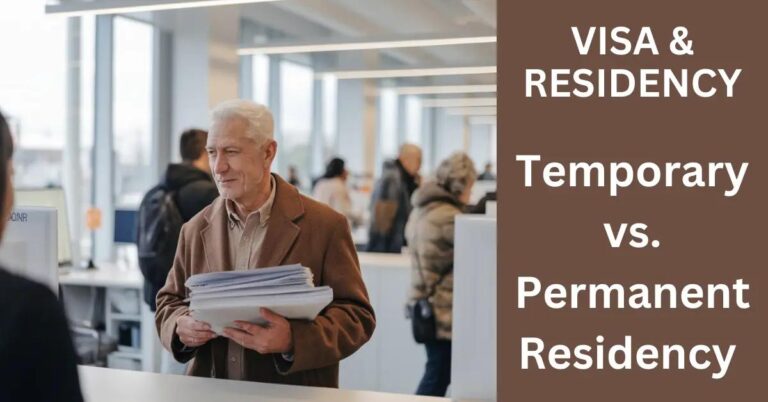TL;DR:
- To qualify for French residency: Start with the correct visa type (tourist, work, student), transitioning to a long-stay visa for residency.
- Residency types: Short-term (up to 90 days) and long-term (over 90 days); financial proof required.
- Permanent residency begins with a five-year residence card, eventually moving to a 10-year card based on stable income and integration.
- Non-EU citizens: Temporary residence permits are renewable; longer residency requires continuous living.
- Essential documents: Valid passport, application form, income proof, health insurance, housing.
- Expats face challenges in integration, tax rules, and potential Brexit changes for UK citizens; benefits include lifestyle and culture.
- Work (job offer), study (school acceptance with funds), retirement (€1,219/month) have unique residency paths.
- Residency renewal: Start 3 months early, abide by local prefecture requirements, maintain legal compliance.
Navigating the residency maze in France is crucial for every Global Nomad seeking a new life in this captivating country. You need to grasp the essential residency requirements, starting with understanding the visa process and what qualifies you for residency. In this guide, I’ll explain how to move from short-term to long-term residency and the importance of financial proof. Avoid common pitfalls with my insights, and start your French adventure informed and ready!
What Are the Basic Residency Requirements for France?
To qualify for residency in France, start with a visa from a French embassy. Pay close attention to the France visa process since each visa type serves different purposes. Choose the right type based on your plans.
Initial Visa Requirements and Types
Visas vary widely, like tourist, work, or student categories. For short visits, a Schengen visa fits, but long stays need more, like a long-stay visa. Long-stay visas can turn into residency permits, a big step for living legally in France.
Distinctions Between Short-Term and Long-Term Residency
Residency in France divides into short- and long-term. Short-term lets you stay up to 90 days. Long-term is for periods over 90 days, letting you live, work, or study continuously. Each requires meeting health, housing, and financial criteria.
Importance of Proof of Income for French Residency
Financial proof is crucial in France. You need to show means to support yourself when you apply. This reassures authorities of no reliance on French public funds. Income can stem from jobs, education, savings, or pensions.
Common Missteps in Residency Applications
People often forget essential paperwork, leading to delays or denials. Not understanding visa categories can also cause big problems. I suggest double-checking requirements and speaking with an immigration advisor if needed.
Knowing the details of residency requirements is key to success. Careful prep for your application can smooth the path to living there. Always keep your goal in focus and remember that patience is your ally.
How Can I Obtain Permanent Residency in France?
To get permanent residency in France, you need a strategic approach. The path begins by obtaining a five-year residence card. This card allows you to live in France for five years continuously. To qualify, you must demonstrate your intention to reside permanently.
After holding the five-year card, you may apply for the 10-year residence card. Wondering about the requirements? You need stable income and knowledge of French culture. These show your ability to integrate into French society.
Longevity in France builds your case for the 10-year card. Have you been living legally and continuously for five years? If yes, you demonstrate your commitment to French life, which is key.
Let’s talk about renewing your permits. Renewal depends much on your situation when applying. Always check your local prefecture’s requirements ahead of time. Rules might shift, so staying informed is crucial.
Looking beyond residency, citizenship is the next step. After living in France for at least five years, you become eligible. Speak fluent French and prove your integration. Good conduct records count, too.
What if residency laws confuse you? Legal aid is available. France has resources to guide your application process. Experts can help with complex paperwork and legal jargon.
For those seeking help, consult local immigration offices or legal advisors. They provide up-to-date information and assist with applications. Their advice can save you time and effort in navigating France’s residency landscape.
Step-by-step, you build towards your goal of permanent residency or citizenship in France. Each stage demands attention to detail and commitment to living in France long-term.
What Are the Residency Options for Non-EU Citizens in France?
Understanding how to live in France can be a puzzle. But don’t worry—I’m here to help. If you’re a non-EU citizen, the first step is to know the residence permit options available to you.
First, let’s talk about types of permits. You can apply for a temporary residence permit. This lets you stay in France usually for up to one year. A temporary permit can be renewed but doesn’t lead to permanent residency directly.
For those who wish to stay longer, you can aim for permanent residency. This requires more steps, and you need to live in France continuously for a few years. After that, you can apply for a long-term residency permit, which has more benefits.
The application process involves navigating French immigration policies. This might seem hard, but it’s crucial to know the rules. You need to submit necessary documents. These include proof of income, housing, and insurance while applying. Different French regions may have slightly different rules, so it’s good to check local requirements.
Legal support can be a huge help in this process. Advisors can guide you through the residency card application process. They ensure you understand what is required at each step. Do not hesitate to seek help if needed.
Residency for non-EU citizens in France requires careful planning. From understanding permit types to seeking legal assistance, every step matters. Staying informed and having the right help can make a big difference.
How to Apply for a France Residence Permit and Required Documents
Applying for a residence permit in France can seem tricky. Let’s break it down. First, understand the France residence permit application process. You start by gathering all needed forms. This includes a filled application form, a valid passport, and photos.
Next, you need proof of why you are staying. This can be work, study, or family. If it’s work, a contract or job letter is needed. Students need school admission proof. Family reunification requires family documents.
Here is a big question: France residence permit requirements? Precision answer: evidence of stability and income. This means showing you have enough funds. How much? It depends on your situation. But generally, you need income to cover living costs without work. Bank statements or a job contract can prove this.
Another essential paper is health insurance. Everyone needs it, either private or through a job. This is vital to show you can cover health expenses. Also, show where you will live. A lease or housing certificate works.
Watch out for common traps. Always check document dates. Expired documents can cause delays. Keep track of deadlines. Submit well before the current visa ends.
Understanding the French administrative procedures is important. It can feel slow and detailed. Patience is key. Officials need time to check and approve your paperwork. Also, keep copies of all documents you submit.
If you follow these steps, the process will go smoother. Getting the correct documents early will help you avoid issues. This makes the path to living in France much easier!
What Are the Implications of Residency in France for Expats?
Living in France as an expat offers rich experiences, but it also brings challenges. Integrating into French society means dealing with culture and language differences. Local customs and traditions might surprise you. Knowing some French can help you connect with locals and feel at home.
Expats also face practical challenges. Understanding tax rules is crucial, especially if you have dual residency in France. You might need to deal with taxes both in France and your home country. Seeking advice from tax professionals can help you stay compliant and avoid headaches.
For UK citizens, Brexit has changed residency rules in France. If you’re from the UK, different residency rules now apply. You might need to adjust to new visa requirements and other legal changes. It’s important to stay updated to avoid any legal issues.
Getting residency in France as a US citizen involves a clear process. First, you need a visa to enter the country. Then, apply for a residence permit once you arrive. This requires paperwork and proof of financial means. Having a job offer or family ties in France helps your application.
Despite challenges, expats in France talk about many benefits. The lifestyle, food, and culture make it worth the effort. Meeting new people and exploring beautiful places are common joys expats share. Many say the experience is life-changing.
Residency impacts expats in France in different ways. Each person’s journey varies with unique stories and lessons. Talking to others who’ve moved before can inspire and guide newcomers. Be sure to learn from their experiences to make your own transition smoother.
For more detailed guidance, you might consider checking official sources or even talking to expatriates who have made the move successfully. This can offer insights into living in France as an expat and what to expect from this exciting journey.
What Considerations Are There for Residency for Work, Study, or Retirement?
Moving to France for work, study, or retirement brings specific steps and needs. Let’s explore each path to help you plan better.
For students, acquiring French residency usually begins with a student visa. You need proof of acceptance to a school in France. Students must show enough funds to cover living costs, about €615 per month. Financing can come from scholarships, savings, or family support. The student visa allows part-time work, giving you experience and extra cash.
Work-related residency permits require a secure job offer from a French company. The Critical Skills Permit is one option. To qualify, the job must pay at least €38,475 per year. This permit aims to draw skilled workers to France. Your employer should help by providing necessary documents.
Retirees can seek residency when they plan to live in France long-term. You need a non-EU citizen permit called a “Visitor” visa. Retirees must show they have funds to live without working, typically €1,219 per month. Health insurance is also needed. France offers beautiful landscapes, culture, and a relaxed lifestyle, making it ideal for retirees.
Sponsoring family members can become part of your residency plan. You can apply for family reunion permits. Your loved ones will need their documents and proof of relationship.
To keep your residency financed, you need budgeting. Understand all related costs like rent, utilities, groceries, and insurance. Living in major cities like Paris is costlier than in rural areas. Evaluate your income and make financial plans for long-term stays.
Each path to residency in France has unique needs and benefits. Be sure to gather all required documents and seek advice if needed. Taking these steps will help you enjoy your time in France without surprises.
How Can You Maintain and Renew Your Residency in France?
To keep your residency permit valid, you need to follow the right steps. First, let’s look at the renewal process. You must apply before your permit expires. Check with your local prefecture—the one that holds your residency details. Gather all required paperwork early, as getting documents can take time.
Now, for the Temporary residence permit in France, you need to renew it annually. Visit your local prefecture to start this process. If you stay in France for five years, you might qualify for a 5-year residence card. This longer card needs less frequent renewals.
Keeping your legal residency status matters. Meet legal rules, such as paying taxes on time. If you ignore these laws, you risk losing your status as a resident. Residency compliance requires always having the right paperwork in order. Submit renewals with all supporting documents, including proof of income and address.
Understand the timelines for renewal. Start the process three months before your permit’s expiry date. This gives you enough time to fix any issues with your application. If you need help, use official channels like the local prefecture’s website or the French consulate.
For more resources, official French government sites offer details and updates. Seeking help from legal advisors or agencies can be wise, too. They know the latest changes in laws and offer guidance tailored to your situation. Staying informed and proactive helps to ensure your residency journey in France is smooth and hassle-free.
Conclusion
In summary, securing residency in France involves understanding diverse visa types and permits. Complying with income proof and avoiding common mistakes smooths the application. For long-term, a 10-year card opens paths to citizenship. Non-EU citizens must navigate specific policies, while all applicants need essential documents. Residency comes with cultural integration challenges but also enriches life. Planning for work, study, or retirement influences permit type. Always remember to renew your residency on time to maintain compliance. Embrace the journey with patience and informed preparation. Pursuing residency in France is achievable with the right strategy and resources.







